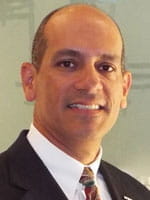Dr. Rafael Matos explains how his PhD in Psychology changed the way he approaches his work.

Dr. Rafael Matos
When the U.S. Marines were assessing maintenance manuals they use in the field, they wanted to examine not just the technology but also its use. Would Marines inside a tank making repairs benefit from a monocle that allowed them to read a manual via the lens, like Google Glass? Or was an electronic manual on a wristband, like a quarterback’s arm playbook, a better option?
In the end, Dr. Rafael Matos ’13 discovered that high-tech solutions were not the answer. What’s more, he didn’t discover the answer through the mathematical analysis he traditionally employs—he learned it by asking the Marines themselves. “After talking to them to understand their motivations, I found they’d rather exit the tank to read the manual and go back in to complete the repair,” he says. “The technology wouldn’t expedite their work.”
This experience underlined the value of understanding human behavior for Matos, which is why he enrolled at Walden to earn his PhD in Psychology. with a specialization in Organizational Psychology in 2009. Although he already held a master’s in operations research, Matos, a retired Navy lieutenant commander who is now a senior operations research analyst for WBB in Reston, Virginia, knew he needed to pivot the focus of his team’s work: How and why do we make decisions? How do we meld statistical findings with human behavior?
“Sometimes math produces results that don't align with an organization’s priorities,” says Matos. “Trend analysis and mathematical modeling wasn’t revealing what we wanted to know. I wanted to learn why people make decisions the way they do.”
For many of the projects he works on at WBB, he and his team balance the opinions of product designers, budget experts, and field operators. He still starts by examining the raw numbers, but now his next step is to analyze the players: learning about their backgrounds, discussing the project, and, finally, integrating their input into his team’s recommendation. Pivoting the way his team works has led to unexpected, but very positive, results, he says.
For example, when the Navy asked WBB to examine the layout of operations centers where staff respond to emergencies like hurricanes, wildfires, and snowstorms, they realized headquarters wanted highly customized designs while the budget office preferred a cookie-cutter solution. “My research allowed me to look at the organizations involved and the services emergency response personnel provide. They each think differently and have their own biases,” he says. Ultimately, the proposed solution was for semi-customized centers based on what the teams needed, not what they wanted.
How he revised his thinking, research, and execution is all based on what he learned at Walden, he says. “In class, we talked about group dynamics, discussed techniques to solicit unbiased input, and realized the importance of presenting information using appropriate language and demeanor,” Matos explains. “My Ph.D. helped me see the people behind the math and become a better facilitator.”



